|
If Oleanna had been released for the first time this year, it would have doubtless been seen as a hand grenade tossed into the heart of the #MeToo debate, one specifically crafted to cause serious injury to both sides. It has the potential to enrage men and women equally but for different reasons and could even cause divisions amongst those who have experienced sexual abuse at the hands of those in positions of nominal power. Some may applaud its suggestion that in their dealings with women, men sometimes do not appreciate how insensitive and intimidating their behaviour and language can be, whilst others will be angered by the suggestion that when a woman cries rape she might be confused or even lying. Which is pretty much what happened when David Mamet's controversial play was first performed. In his review of this later film adaptation, Roger Ebert remembered it as one of the most stimulating experiences he ever had in a theatre, recalling that it enraged the audience and that loud arguments broke out both in the intermission and after the play. And it's as a play that it's still primarily remembered, with this film adaptation, despite being directed by Mamet and casting William H. Macy in the role he played on stage, generally regarded as a footnote to the theatrical original.
So what's the problem? Well if you're new to the play and the film and you're looking to take maximum offence then you might want to skip this bit and go in unprepared. I certainly did on my first viewing but could not say with any confidence even now whether this was a wise or a foolish move. I'll get to my own reactions in a minute, and even then am aware that I'll have to choose my words carefully. Let's deal with the story first, and while my intention was to keep this description brief, in order to even discuss the controversy that is central to both the play and the film, I do have to reveal some key aspects of how the story pans out in its second and even third acts, which in normal circumstances would count as major spoilers.
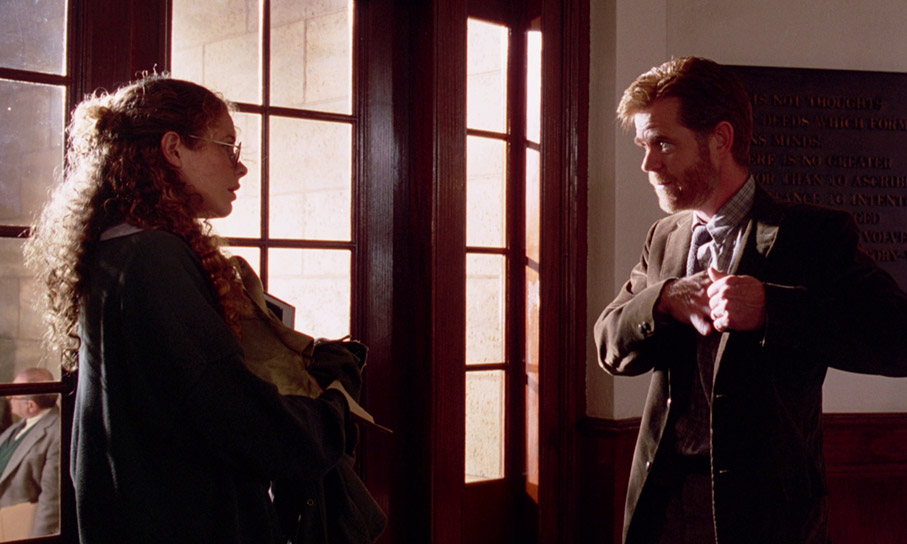
College professor John has finished for the day and is just heading home when he is confronted by one of his students, Carol, who is on the verge of failing her course and is frustrated that she doesn't understand the content of the classes that John teaches, despite having read his book and attended all of his lectures. John is on the brink of being granted tenure at the college, which will land him a substantial salary increase that he is preparing to spend on a new home, and his conversation with Carol is repeatedly interrupted by calls from his wife about a house viewing that both are scheduled to attend. Due to this, he initially tries to brush Carol off, but when she continues to press him he has a change of heart and offers to help her, drawing on his own earlier experience of being classed as a failure and attempting to qualify the claims he has made about the questionable value of higher education. Despite a couple of moments of emotional anxiety, when John finally departs, the two appear to be on friendly terms. Yet as the second act begins, they are back in John's office on frostier terms. John is now facing the possibility that he will be refused tenure due to a complaint lodged by Carol about his behaviour during the previous meeting, she having accused him of using sexist and even pornographic language and sexually harassing her.
By this point, audience divisions should really be setting in, but it's in the third act that most of the fights should break out, and if you want to avoid spoilers I'd definitely hop ahead a paragraph or even bail out here. We're back in John's office an unspecified time later. Carol's complaint against him has been upheld and he has not only lost tenure but has been suspended and is in the process of packing up his things. He has once again asked to meet with Carol in the hope that she might still withdraw her accusation, which he believes are unfounded, but Carol has grown more confident and now feels able to lecture him on his flaws. She also reveals that the sexual harassment charge against him has taken a more serious turn.
Even discussing this play or this film is fraught with traps for any reviewer to fall into, and I'm certainly no exception on this score. If you know the play or the film and you've just read the above then you'll doubtless have noticed that even in my attempt to take a balanced approach, my outline is still skewed towards a specific viewpoint. This, I should point out, was not conscious on my part. I was trying to describe what unfolded without going into too much detail – in part because I want to analyse that more fully below – and in the process have outlined events as they unfold from primarily John's point of view. I realised this after I had written it, but chose not to rewrite it precisely because this should give you an idea of how difficult it is to remain completely neutral here. But then, you're not supposed to. This is clearly a play that was designed to provoke debate and extreme responses, a mission statement neatly summed up by the one of the film's original taglines, "Whatever side you take, you're wrong." I'd also argue that I've taken a more restrained line than many did when first exposed to the play – on this very disc, both William H. Macy and his co-star Debra Eisenstadt recall audience members loudly shouting for John to inflict physical violence on Carol as their conflict climaxed. And it's worryingly easy to sympathise with that viewpoint, at least on a first viewing. Then again, even making that statement makes me question whether I'm talking from a defensively male perspective. I'm thus going to try and present two alternative interpretations of the story, the first from John's viewpoint, the second from Carol's. Go with me on this as the first one may prove an uncomfortable read.
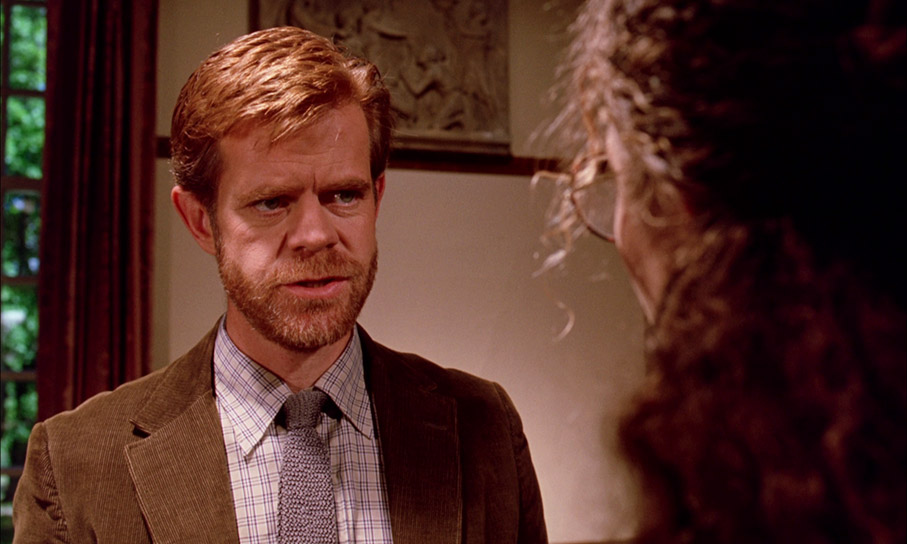
JOHN
John is a successful and respected college Professor. We know this because he is being offered tenure, a position of privilege and security not dished out to just anyone. One of his students, Carol, is struggling, and while he wants all of the students to pass the course, it is only ethically correct that he should mark her work accurately, which could result in her failing his class. He is just leaving work one day when Carol comes to see him to talk about this. She appears frantic about her grades and about her inability to understand what others in the class seem to have little trouble grasping. She is clearly insecure and has anxiety issues, and continues to pester him relentlessly for advice, prompting him to delay an appointment he has promised his wife that he will keep to look at the new house they are planning to buy. So desperate are her pleas that John, who likes Carol enough to want to see her succeed, agrees to try and help her after all. He first tries to address her insecurity about her ability by recalling a story from his own past when he was consigned to failure by others, then offers to privately tutor her to get her grades up to scratch and clarify some of the aspects of his teaching that she doesn't understand. When her anxiety peaks and she seems to be bordering on hysteria, he calms her down and attempts to reassure her. By the time the two part company, he feels they are communicating and that Carol is making progress. He is thus shaken when instead of responding to his offer to help, she instead sends a written complaint to the tenure committee accusing him of inappropriate behaviour and language, and of attempting to sexually assault her. He knows full well that the claims are false, or at the very least the result of psychiatric issues on Carol's part. When the complaint is upheld and John tries to reason with Carol, it is clear that she has gained a taste for the power she is now able to wield over him, sabotaging his hopes of tenure, losing him his job and potentially wrecking his marriage. She lectures him on his behaviour and even tries to blackmail him by offering to withdraw the complaint is a number of specific demands are met, including a list of books that she and her "group" have deemed inappropriate and insist be removed from the recommended reading list, including one authored by John that he has built his teaching around. Carol is clearly a man-hating ball of pathological insecurity whose psychological problems have been seized on and stoked by a hard-line feminist group, and she is now drunk on power and prepared to destroy the life and work of a decent man in the name of her new-found ideology. This peaks in her false accusation of attempted rape and her demand that he change how speaks to his own wife. What has he done to prompt such a spiteful response from this mixed-up and vindictive girl?
CAROL
Carol is struggling to understand teaching material that others on her course seem to have little problem with. She comes from a humble background and has had to work harder than others at the college to get this far, and the prospect of failing the course because the concepts and ideas taught on it do not make sense to her is almost too much to bear. In desperation, she decides to speak to her professor after class one day in order to seek his advice and make it clear to him how important passing this class is to her. Communicating with him is initially a struggle as he appears preoccupied with his upcoming tenure interview and the new house he is buying, and their conversation is repeatedly interrupted at key moments by phones calls from John's wife asking where he is. He also repeatedly talks over her when she is trying to speak, giving her the impression that he is not listening to her. His story of how he was also cast as a failure in his younger days is both surprising and encouraging, but she is made to feel uncomfortable by an anecdote he uses to make a point involving how often people of different social classes copulate. Why would he tell her that particular story? She's made uncomfortable by his admission that he likes her, and when he tells her that she can get an A grade if she just comes back to see him regularly after classes, she is deeply troubled by the implication of this. She doesn't like to be touched, and when she becomes upset and John responds by grasping her by the shoulders and holding her, she is left feeling confused and violated. The over-confident John appears to be abusing his position of authority and attempting to initiate a relationship with her, something she never had any interest in. Why else would he repeatedly dismiss urgent calls from his wife to stay with her instead? Left deeply troubled by the incident, she feels unable to stay silent and decides to lodge a formal complaint, and encouraged by an on-campus support group that she joins, she decides to make a stand against the male arrogance, self-importance and abuse of power that is making life so uncomfortable for some of the female students.
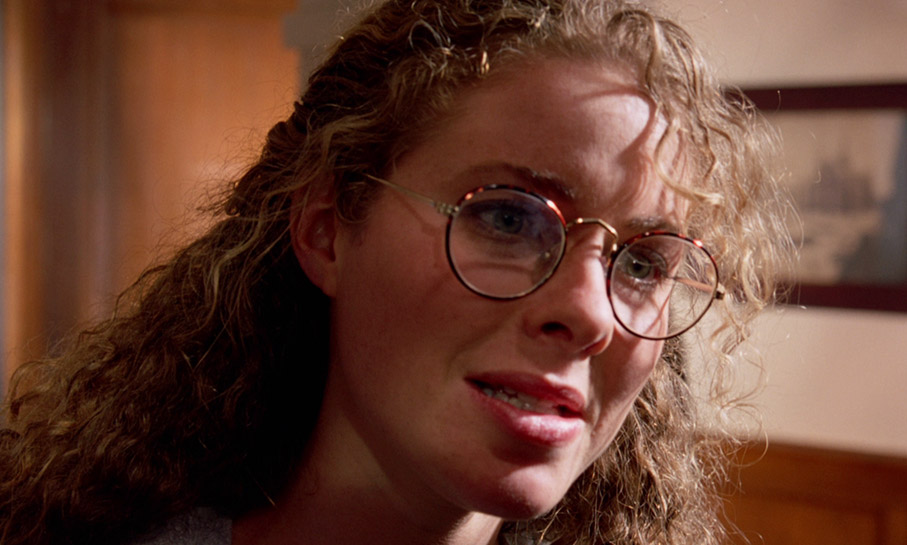
I should note that neither of these readings is fanciful and both were formed simply by watching and taking note of everything that unfolds on screen. I would, however, suggest that the first interpretation is the one that most audiences – myself included – tend to feel steered towards on first exposure to play or film and it takes a second viewing to really appreciate the alternative point of view that is also being offered. Yet however you read it, you're unlikely to be comfortable with whatever it is trying to tell us, and several viewings in I'm still not sure what that is. There's certainly something to be read into the fact that as a male viewer I had to revisit the film and open my mind a little to really appreciate Carol's viewpoint, and I'm still not at ease with the third act presentation of her as a dogmatic shrew, one whose self-righteous demeanour, more masculine and authoritarian dress sense and repeated references to "our group" seem deliberately calculated to get an audience's back up. But again, I'm coming at this from a specific gender-cultivated viewpoint, and – full disclosure here – someone who has also worked as a college lecturer and had to privately counsel students who were falling behind and in danger of failing the course. And before you rubbing your hands in anticipation at the prospect of similarly problematic confrontations on my part, I should state up front that I never had any such issues and any advice given by me was either taken on board or cheerfully discarded by students I never had major conflict with. But my own experience did make me sensitive to the things that John does and says that could be misread by Carol, if indeed she is misreading them. I thus wince a little when he tells her he wants to help her because he likes her or when he offers to tutor her privately by suggesting that she'll get an A grade if she just meets with him regularly after class. As a workplace union rep, I've defended colleagues in disciplinary hearings that were initially triggered by such an ill-considered choice of words.
But I'm also aware that I'm living in an age in which we are, one would hope, more sensitive to such things, and that you won't have to go back far to find behaviour and language that would now be deemed inappropriate or unacceptable, or responses that some might regard as extreme even within the supposedly more socio-politically savvy world of academe. Many years ago, when I was in art school, two of the female students on the course with whom I used to hang out were members of a campus-based feminist group that took its inspiration from Valerie Solanas' SCUM Manifesto. If you're new to this document, then know that SCUM was an acronym for "Society for Cutting Up Men" and that the manifesto urged women to "overthrow the government, eliminate the money system, institute complete automation and eliminate the male sex." Solanas later did her bit for the cause by shooting and almost killing Andy Warhol. Thankfully, neither of my friends went that far, but they did take an aggressively zero-tolerance attitude to any language or behaviour that could in any way be interpreted as remotely sexist. As I was to learn, they had good reason.
A couple of years later I was at film school when I overheard a photography lecturer say to his colleague about a female student who was unhappy about the way they behaved towards her, "She'll have to get used to being felt up if she wants to get anywhere in this business." You heard me. Even as an as-yet not politicised teenager I was a startled by this, and if I heard it today then I'd back Carol all the way in any complaint she cared to make and probably even make the complaint myself.
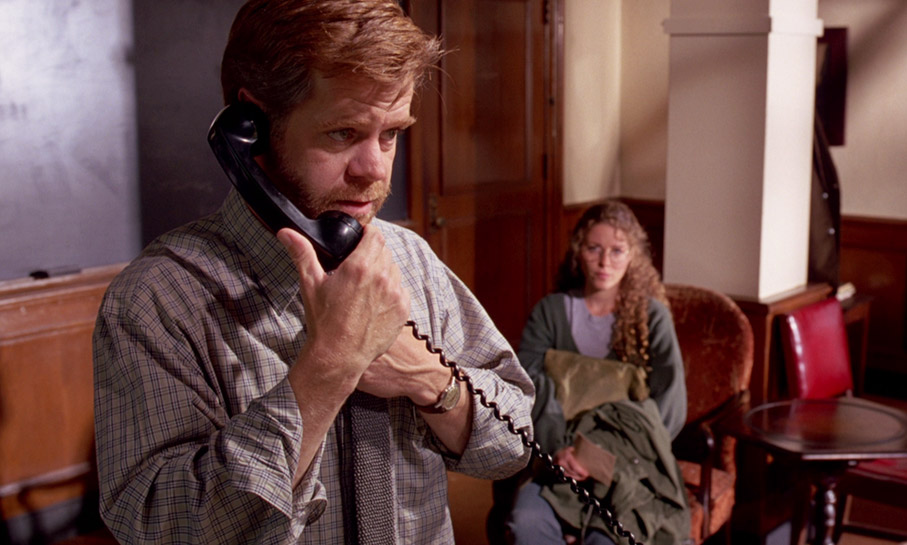
Of course, what made the play such a compelling experience had less to do with the controversy it so readily provoked than Mamet's typically extraordinary use of language, a crucial element that has been carried over unscathed into Mamet's own film adaptation. From the off, we're firmly in the author's territory, as John converses with his wife on the phone and is only able to complete every fourth or fifth sentence, a unidirectional dance of words every bit as deliciously fractured as Jerry Lundegaard's stuttered protestations in the opening scene of Fargo, which was also delivered by William H. Macy exactly as scripted. When the conversation between John and Carol begins, it unfolds like a high-energy verbal tennis match in which each repeatedly tries to gain the advantage, with both speaking without giving any real consideration to their words and instead blurting out the first things that come into their heads. Both are self-absorbed and seemingly incapable of understanding the other's point of view and are not communicating in any meaningful way. Thus the foundations for later conflict are set up without either party aware of what they are participating in, which initiates a virtual role-reversal that ends with Carol lecturing John as he echoes her words from earlier and proclaims in desperation, "I don't understand!"
The performances of William H. Macy and Debra Eisenstadt, who understudied Rebecca Pidgeon in the original production and eventually moved up to second lead, are extraordinary, their grasp of the dialogue and character interplay by this point honed to perfection, which builds to an explosive final confrontation and outpouring of hateful anger that still delivers a considerable jolt. Yet on its release, the film was not well received by critics. It didn't help that many of these reviewers were familiar with the stage production and understandably felt that the film lacked the immediacy and audience response that made the play such an electrifying experience. And while a two-hander set in a single location works fine on the stage, the demands of cinema are different from that of theatre, and cinematically this leaves Mamet the director with almost nowhere to go. James Foley's film adaptation of Mamet's Glengarry Glen Ross was able to open the play up to include exterior locations, while the main office set was large enough to afford him considerable freedom when it came to blocking the actors and placing his camera. Save for a few very brief outside excursions, Mamet and his actors are confined to a solitary and physically restrictive location (the film was shot in the Metropolitan State Hospital in Massachusetts rather than in the more controlled environment of a specifically constructed studio set), which itself puts some constraints on Mamet's technical direction, as he alternates between close-ups, two shots and wides in the same two connected and wood-panelled rooms. But this also gives the increasingly fraught exchanges between John and Carol a more claustrophobic and oppressive feel, and in the casting of Macy and Eisenstadt, Mamet still captures and indefinitely preserves the essence of the original production and makes it available for the appreciation (or otherwise) of a wider audience.
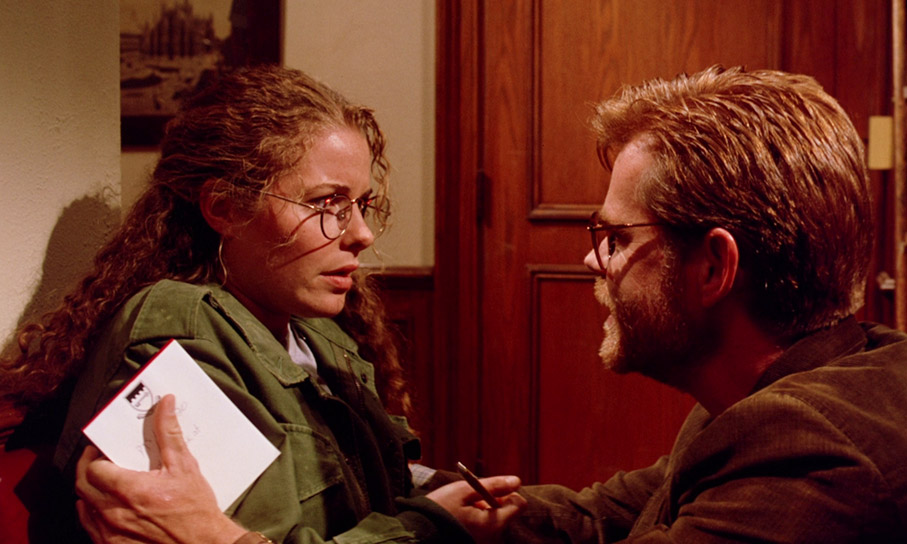
Ultimately, it's for the dialogue and performances that the film continues to have value, despite its inherent inferiority as an experience to a stage production that most do not and will not ever have easy access to. And if the film version also has the power to prompt viewers to question how they behave towards others, particularly those over whom they may have a degree of theoretical power or influence, or even prompt heated debate on the subject, then it's done its job, if indeed that was the job it set out to do. There seems little doubt that Mamet was looking to provoke, but when questioned on the subject once his revealing response was "Why can't I show a woman telling lies?" And let's not forget that Mamet has been open about his political shift from liberalism to free market conservatism and that he has been dismissive of what those who want to be free to insult people on racial, religious or gender grounds like to disparagingly dismiss as political correctness. Watch the film again with that in mind and read into it what you will. It still left me reeling.
Oleanna was shot on 35mm film but framed in the unusual – at least for a modern American feature – aspect ratio of 1.66:1, which actually contributes to the oppressive feel of the confrontational scenes by bringing the actors into closer proximity to each other when framing them together. Whether this was cinematographer Andrzej Sekula's intention is a question I'm not in a position to answer, but it certainly feels as carefully calculated as Mamet's dialogue and works for the decision to shoot on location. The colour is pleasingly and appropriately naturalistic, and while the contrast can feel a little aggressive in places and the blacks deep enough for a panther to get lost in and some hightlight are burnt out (which may be intentional), when the light levels are brighter the balance is spot-on. Detail is sharp, any dust has been cleaned up and there is no trace of damage, should there ever have been any. A fine film grain is just visible, but you'll need to get close to the screen to see it. On the whole, this looks very good.
The Linear PCM 1.0 mono soundtrack is in excellent condition, boasting crystal clear reproduction of dialogue and effects, and that's all you can ask of a work whose soundtrack is built almost entirely around these two elements.
Optional English subtitles for the deaf and hearing impaired are available.
Power Play (17:24)
A busy and revealing chat with actor William H. Macy, whose initial reaction to the character of Carol was similar to that of many of the audience members, while his first response to the script, as it apparently is with many of Mamet's plays, was "Oh Dave, you can't do this!" He recalls doing the first run of the play in Boston with Rebecca Pigeon, his alarm at the prospect that audience members might mount the stage and attack them, and the response of a group of college professors on opening night, who initially booed them but were later yelling, "Kill her!" He talks about taking the play to New York, where the larger audiences resulted in even more audience feedback, and how he attempted to bring something fresh to the role for the film version. He also discusses working with Mamet and describes him as a fabulous teacher, adding "He knows more about acting than anybody I've ever known."
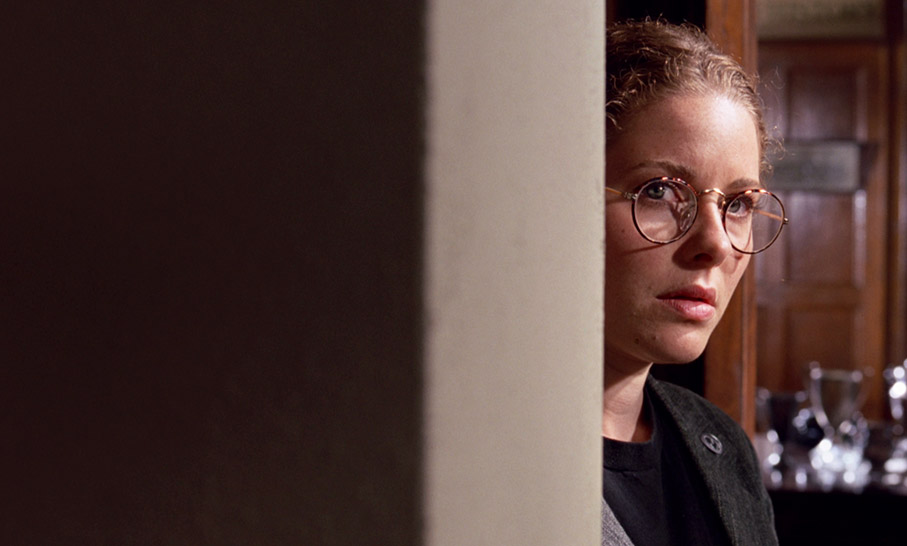
The Understudy (11:09)
Debra Eisenstadt reveals that she knew about Oleanna and the controversy surrounding it and even applied to be Rebecca Pigeon's understudy before she actually saw the play. Her view of Mamet as a director differs somewhat from Macy's, describing him as kind but mysterious and stating that she feels she didn't get to know him at all, while she and Macy became like brother and sister when doing the play and the film. She appreciates that it's very easy to take John's side, but suggests that if you really listen you can appreciate Carol's viewpoint, and reveals – and this one really surprised me – that her subsequent auditions were hampered when potential employers were mad at her because they treated her as if she was Carol instead of an actor who had played her. She also talks about becoming disillusioned with acting and moving into writing and directing instead.
Theatrical Trailer (2:04)
A tricky sell, and underscoring extracts that spell out the conflict between the lead characters a little to crudely with pulsing tension music does it no favours. There are spoilers here, but probably fewer than I've delivered above.
Image Gallery
A meagre 9 slides of promotional stills and posters.
Booklet
Once again, I got ready to wince at seeing everything I'd written being covered more creatively, particularly when I saw the title of the first essay in this booklet by Rebecca Nicole Williams was An Index of Badness: Oleanna in the Age of Disclosure. But what unfolds is a detailed, authoritative and thoroughly researched piece on Mamet, the play and the film adaptation, one that effectively then hands the discussion about its role and relevance in the age of #MeToo over to us to continue. Up next is a useful look at the controversy that surrounded the play (did I mention that?), one built around extracts from contemporary articles and opinion pieces, which is followed by extracts from reviews of the film adaptation, most of which are critical. Promotional imagery and full credits for the film have also been included.
That the film doesn't capture the immediacy of the play and its heated audience response almost goes without saying, but under Mamet's guiding hand the film still compellingly showcases his words and boats a pair of dynamite lead performances. If you've never seen the play, then I'd suggest you won't feel seriously short-changed by the film – see it with friends and watch the arguments that some will tell you only take place at the theatre break out in your living room instead. The HD transfer is typically strong, and while there are fewer special features here than usual for an Indicator disc, both of the interviews are excellent and the booklet, as ever, is a terrific read. It's still incendiary stuff, but comes highly recommended nonetheless.
|